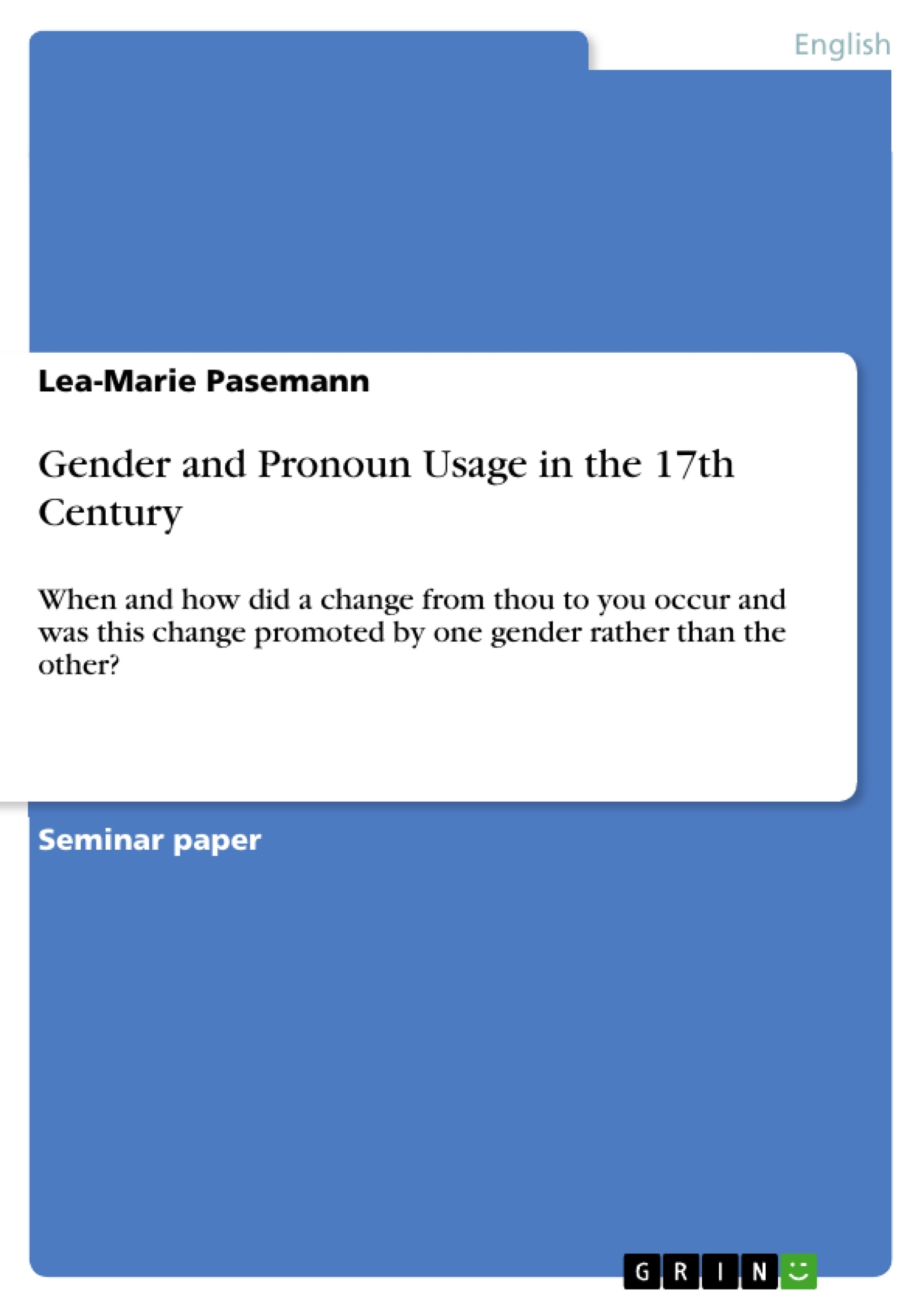Language changes, all the time. This is true because English spoken a millennium ago significantly differs from English spoken today. But how did it change and who were the in-novators who promoted language change in the course of time?
It is the aim of the following research paper to show how and why the pronominal system changed from thou to you as the standard second person singular pronoun in the course of the Early Modern English period (1500-1700). More precisely, private correspondence from the 17th century will be examined to see why thou or you respectively were chosen and if it was one gender rather than the other who mainly contributed to the standard that we have today. The first chapter is going to shed light on Renaissance England and its demographical facts with particular emphasis on the role of women. General information will be included as well as some facts about family life, and most importantly, about education and literacy, which is imperative for language change found in written texts. The second chapter is going to investigate when, how and why a change in the pronominal system from thou to you occurred. In order to do so the concepts of power and solidarity as well as aspects of politeness theory will be considered. Chapter two is going to finish with a summary of assumptions about gender differences in pronoun usage. In chapter three a small-scale qualitative analysis of letters by female and male writers to family members will be carried out. The material is taken from the Corpus of Early English Correspondence (CEEC) as well as from the Helsinki Corpus (HC). It will be examined if the concepts brought forward in chapter two, e.g. affection or anger and matters of social stratification, e.g. super-/subordination played a role in language choice and, ultimately, language change. It is going to be the aim of the fourth and last chapter to summarize the findings and an attempt will be made to form a conclusion to the question asked initially.
Inhaltsverzeichnis (Table of Contents)
- Introduction
- Early Modern England
- Demographical facts and social structure
- Family Life
- Education and literacy
- Changes in the pronominal system in Early Modern English - when, how and who?
- The history of thou and you
- Implied meanings of pronoun usage and the importance of power, solidarity and politeness theory
- Assumptions about gender differences in pronoun usage
- Second person singular pronouns in Early Modern English private correspondence
- Second person singular pronouns in women's letters
- Second person singular pronouns in men's letters
- Comparison of the findings and conclusion
Zielsetzung und Themenschwerpunkte (Objectives and Key Themes)
The research paper investigates the shift from "thou" to "you" as the standard second person singular pronoun in Early Modern English (1500-1700). This research focuses on the specific context of 17th-century private correspondence, exploring why writers chose "thou" or "you" and whether one gender played a more significant role in promoting this linguistic change.
- Pronoun usage in Early Modern English
- The shift from "thou" to "you"
- Gender differences in pronoun usage
- Power, solidarity, and politeness theory
- Social and cultural context of Early Modern England
Zusammenfassung der Kapitel (Chapter Summaries)
The first chapter provides a concise overview of Renaissance England, encompassing its demographic composition, social structure, and the crucial role of education and literacy. This background information sets the stage for understanding the linguistic context of the examined correspondence.
The second chapter delves into the historical evolution of "thou" and "you" as second person singular pronouns. It explores the implied meanings associated with each pronoun, emphasizing the influence of power dynamics, social solidarity, and politeness theories.
The third chapter examines a selection of letters written by both men and women in the 17th century. This chapter investigates how the concepts discussed in the previous chapter, such as affection, anger, and social hierarchy, influenced pronoun choice and contributed to the ongoing linguistic change.
Schlüsselwörter (Keywords)
The main keywords and focus topics of this research are: Early Modern English, pronoun usage, second person singular pronouns, "thou," "you," gender differences, power, solidarity, politeness theory, social stratification, private correspondence, letter writing, and language change. This research explores the dynamics of pronoun choice in Early Modern English through the lens of social, cultural, and gendered factors.
Frequently Asked Questions
How did the use of "thou" and "you" change in the 17th century?
During the Early Modern English period, there was a significant shift where "you" gradually replaced "thou" as the standard second person singular pronoun.
What roles did gender play in this linguistic change?
The research examines whether men or women were the primary innovators in adopting "you" as the standard form in their private correspondence.
What is the significance of "Power and Solidarity" in pronoun choice?
These concepts explain that "thou" was often used to show intimacy (solidarity) or to address social inferiors (power), while "you" was more formal and polite.
How did education and literacy affect language change?
The level of education and literacy, particularly among women in Renaissance England, was a crucial factor in how these linguistic shifts were documented in written texts.
What sources were used for this qualitative analysis?
The study analyzes letters from the Corpus of Early English Correspondence (CEEC) and the Helsinki Corpus (HC).
Can emotions like anger or affection influence pronoun usage?
Yes, the research explores how writers might switch between "thou" and "you" to express specific emotional states or changes in social hierarchy.
- Quote paper
- Lea-Marie Pasemann (Author), 2009, Gender and Pronoun Usage in the 17th Century, Munich, GRIN Verlag, https://www.hausarbeiten.de/document/194408


